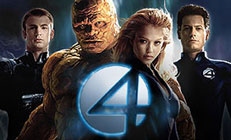|
|
|
|
Fantastic
Four
|
 |
|
This is a strictly by-the-numbers superhero blockbuster. Like many films that are saddled with the task of kick-starting a franchise, it must go back to the beginning and show how its initially ordinary characters discover their super-powers. Since, in this case, such backstory takes half the movie to unfold, the actual plot has to be compressed and delivered in record time. At least the nemesis of the Four is present from the beginning. Dr Victor Von Doom (Julian McMahon) is a villain with absolutely no ambiguity built into his role. And when Reed (Ioan Gruffudd), Susan (Jessica Alba), Ben (Michael Chiklis) and Johnny (Chris Evans) are exposed to a solid blast of cosmic radiation out in space, Doom is also there to soak up the body-altering effects. Much of the film is devoted to a coy treatment of physical mutation – perhaps in order to secretly appeal to an adolescent audience undergoing its own bodily changes. Susan cannot control her powers of invisibility because she is "too emotional"; Ben, once fixed as The Thing, is embarrassed to be seen in public. And masculine identity is a matter of phallic extremes in this movie: Johnny as The Human Torch is all raging libido, while Reed as the rubbery Mr Fantastic is derided for being "limp". In an odd and excessive touch of compensatory political correctness, however, The Thing is handed a blind, black girlfriend – perhaps a concession to director Tim Story, who previously helmed the essentially African-American entertainments of Taxi (2004) and Barbershop (2002). Given the involvement of co-writer Mark Frost, who was an integral part of the Twin Peaks phenomenon, Fantastic Four shows surprisingly little imagination. Even the nerdiest fans of such comic-book fare may be disappointed that the film does so little to dramatise the super-powers of the characters. So what is this movie really about? Two decades ago, Indiana Jones shook up the action blockbuster with its solemn evocation of the power invested in a Lost Ark. It seemed that popular cinema was trying to find some way (however vague, incoherent or unconscious) to deal with the issue of nuclear power and its consequences. Today, in a world massively preoccupied by the actualities and possibilities of war, Fantastic Four is still batting around this symbolism, but without much of a viewpoint on it. Dr Doom is "unlimited energy" run rampant, while the opposition to him posed by the Fantastic Four consists of whipping up a supernova – and then "containing" it. If this is how America sees its role on the world stage, then we are all in trouble. © Adrian Martin July 2005 |
![]()